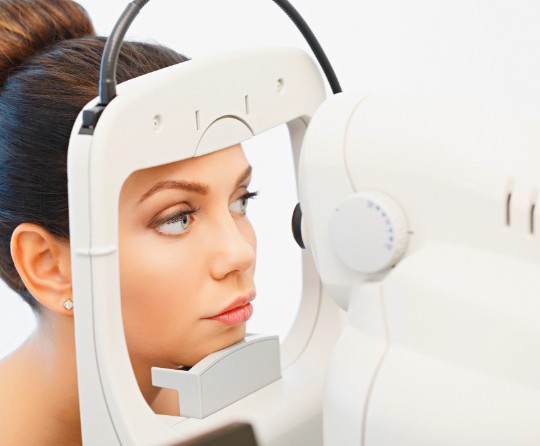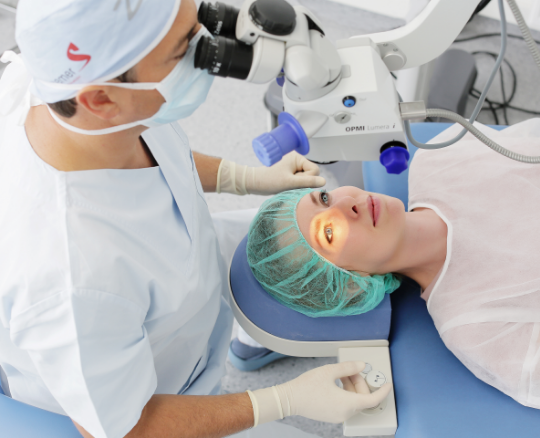Free yourself from glasses and contact lenses with ultra-precise Swiss-optmised laser eye surgery
- We’re so obsessed with quality that we created the Swiss method for exceptional laser eye surgery outcomes




Gain visual freedom with our Swiss method for exceptional laser eye surgery
Discover everything you need to know about laser eye surgery
Are you suitable for laser eye surgery?
We can treat 99% of patients who contact us. However, if you are not suitable for a surgical procedure, we will, unfortunately, have to reject you as a patient. Of course, we will do everything in our power to enable you to have better visual performance. With EyeLaser, the decision is in the hands of ophthalmologists, not opticians, as is often the case with eye laser chains.
No two eyes are alike. Our first priority is to determine the details of your vision and ametropia. To do this, our highly qualified team will use the most modern technologies to perform an examination.
There are different methods for the surgical correction of visual defects. Not everyone is suitable for a classic laser eye treatment. The good news is, we have many alternatives, such as lens implantation, which we can use to correct higher ametropia or thin or irregular corneas.
You will need to meet the following criteria for an eye operation:
If you meet these criteria, you are generally eligible for an eye laser treatment. We can determine which treatment method is best for you during a consultation and a preliminary examination. The following methods are recommended depending on your particular visual defect:
Laser eye surgery for short-sightedness
| up to approx. -10 diopters |
Femto-LASIK/LASIK/SmartSight |
|---|---|
| up to approx. -6 diopters |
Femto-LASIK/LASIK/LASEK/SmartSight |
| approx. -6 to -25 diopters |
Phakic Lenses (ICLs) / lens exchange |
Laser eye surgery for farsightedness
| up to max. +4 diopters | Femto-LASIK / LASIK / Phakic Lenses (ICLs) / lens exchange |
|---|---|
| approx. +5 to +10 diopters | Phakic Lenses (ICLs) / lens exchange |
Laser eye surgery for astigmatism
| up to 5 diopters | Femto-LASIK/LASIK/LASEK/Phakic Lenses (ICLs) / lens exchange/SmartSight |
|---|
Laser eye surgery for presbyopia
| without any other ametropia | PresbyMax / Femto-LASIK/monovision/lens exchange |
|---|---|
| Hyperopia / myopia +3 to -5 dpt | PresbyMax / Femto-LASIK / Monovision/ Presbyopia-LASIK |
| All visual defects | Lens exchange with monofocal / multifocal implants from Physiol x Zeiss, Precizon Prezbyopic, Hoya, or Panoptix (Alcon) |
You can find out more about visual defects and the appropriate methods to correct them on the respective sub-pages. We would be happy to advise you personally on the phone, by email or in our practice. Simply make an appointment with us or visit one of our information evenings.
One of our basic principles is to always work with the latest technology. Why? Because this makes the operation less complicated, not only for us but above all for you. In our eye laser practice, we use only the highest quality and most modern devices on the market.
The femtosecond laser
The femtosecond laser is an infrared laser used to make an incision in the cornea. We also use this laser to create a “flap”, which we lift up and close again after the laser treatment.
We use two types of femtosecond lasers:
Several million interventions have already been carried out with this modern technology.
The excimer laser
With the excimer laser (UV laser), we can correct your prescription in a few seconds. We have two modern eye laser systems:
The cross linking device
We use the IROC UV-X 2000 / AVEDRO KXL. This modern UV radiation device reshapes the diseased cornea due to keratoconus and corneal weaknesses. The device was developed by a team of experts in collaboration with the inventors of the crosslinking procedure: Prof. Theo Seiler and Prof. Eberhard Spörl. Thanks to close collaboration with Prof. Seiler in Zurich, Dr. Derhartunian is very familiar with the device and its precise application.
At a non-binding information evening, we would be happy to show you our devices and explain their function to you in detail!
Risks and side effects of laser eye surgery
As with any operation, eye surgery involves certain risks and side effects. The attending surgeon will explain these to you in detail at your consultation.
Although the complication rate with laser eye surgery is well below 1%, different paresthesia can occur. This depends on the vision correction method chosen. With most laser eye methods, any discomfort disappears after a few hours. You will have good eyesight the next day.
Laser eye surgery has been a scientifically recognized procedure for decades. It is one of the most frequently performed operations worldwide. The risks are extremely low. We reduce those risks even further through:
Nevertheless, we would like to inform you about possible complications:
During your preliminary examination, we will discuss these risks and side effects with you. Ultimately, you should only opt for an eye laser operation if you feel confident in the treating surgeon.

Millions of people around the world have gained their freedom from glasses and contacts but not everyone’s eyes are suitable for treatment. Book an assessment below and find out if you’re suitable and which treatment can help you best:
BOOK AN ASSESSMENTLaser eye surgery with uncompromised quality and precision in Vienna and Linz
Imagine waking up in the morning and seeing the world through clear eyes, taking part in any physical activity without restriction or going on vacation without any worries.
Millions of people all over the world have already experienced the freedom that laser eye surgery provides. It’s the most popular voluntary surgery in the world.
Dr. Victor Derhartunian, EyeLaser’s senior eye surgeon, learned his craft from Theo Seiler. He is the pioneer of the world’s first laser eye surgery performed in 1987.
Since then, this scientifically recognized procedure has been developed and perfected further. Many long-term studies confirm the high success rate and rapid healing of the treatment. The medical procedure has even been approved for jet pilots and astronauts.
There are many types of laser eye treatments. However, they all have one thing in common: they shape the cornea of the eye with high-precision lasers so that you can see flawlessly.
Laser eye surgery at EyeLaser is safe, quick and painless. The treatment only takes 15 to 20 minutes, and you will be able to see clearly within a few hours or days.
We will not treat you according to a formula. We will spend a lot of time with you to tailor treatment specifically to your unique circumstances. We will thoroughly examine and test your eyes so we can determine the perfect treatment method for you.
LASIK is the best known and most commonly performed laser eye surgery.
After this treatment, you’ll have made the smart choice to live life on your own terms and will no longer need outmoded glasses or contact lenses to see. You can live life with the exceptional natural vision you deserve – without compromise.
PRK is a great solution if you want to be free from glasses and contacts but are unsuitable for LASIK. Once we’ve enhanced your vision, everyday activities become optimised with Swiss precision. Whether you’re making a cup of coffee, applying makeup or working out, you’ll be amazed at what you can achieve without glasses and contacts.
SmartSight is the latest and most minimally invasive form of laser eye surgery. After this treatment, you’ll feel confident and ready for whatever life brings without the anxiety around your glasses and contact lenses getting in your way.
ICLs free you from glasses and contacts if you’re unsuitable for laser eye surgery. Even if you have already been told that laser treatment is not possible for you, or you would like to have a reversible procedure to correct your refractive error, a spectacle-free life is possible with ICL surgery.

The specialist will explain your options for eye surgery and record all relevant data. This will include:
Ahead of the preliminary examination for laser eye surgery:
After the preliminary investigation, we will inform you if you qualify for laser or lens surgery. We will also tell you about the course of the operation, the risks and side effects and the aftercare. Of course, we are happy to answer all your questions along the way.
You can then either make an appointment for your surgery on-site or – after sufficient time to think it over – by telephone. We try to allocate the appointments so that they fit into your schedule. The waiting time between the preliminary examination and the operation is one day to a few weeks – whatever works for you. After the initial examination, it is possible to wear contact lenses again.
Ahead of your treatment
On the day of the operation, you will come to our practice with an accompanying person. Please do not use face cream, aftershave or make-up etc., on your face on this day. We will use eye drops to anaesthetize your eye locally. This means you can eat and drink normally.
If you have any final questions, your surgeon can clarify these and perform any further investigations if you have any doubt.
We will give you medication and instructions to use after the operation. We will also make an appointment with you for the follow-up examination the following morning.
The operation itself only takes 10 to 20 minutes. You will then receive protective goggles, and your companion will take you home.
What you should consider after the laser eye surgery
We recommend planning a downtime of one to several days. Your eyes are very sensitive, and most patients report:
The day after the successful operation, you will come to our practice for the first follow-up examination. Your eyesight should be at 90% on this day, and your eyes will feel very comfortable. If your healing is going well, we will schedule the next examination one month later.
After a few weeks, you will have optimal eyesight. During this time, the results may vary slightly depending on the day – please give your eyes some time.
Depending on the package you have chosen, regular checks or follow-up treatments will take place for 1 to 5 years. During this time, you can contact us at any time with questions and arrange check-ups. In the event of a deviation, we will correct your eyesight again free of charge during this period.
We can’t wait for you to enjoy your new lifestyle without glasses and contact lenses!
97% to be precise (we’re Swiss. We measure everything). But don’t take our word for it…
Discover Austria’s most popular laser eye surgeons in the heart of Vienna and Linz

Things like age, eye shape, history and lifestyle make an eye treatment perfect for one person, but not another. Find out which treatment (if any) could free you from glasses and contacts
Take a quiz